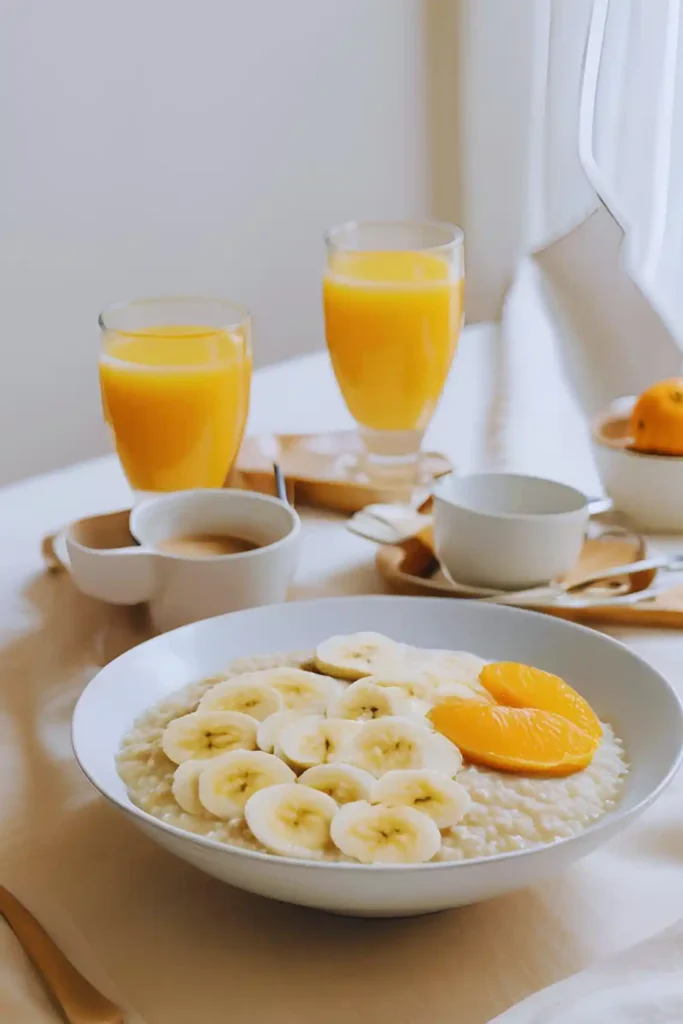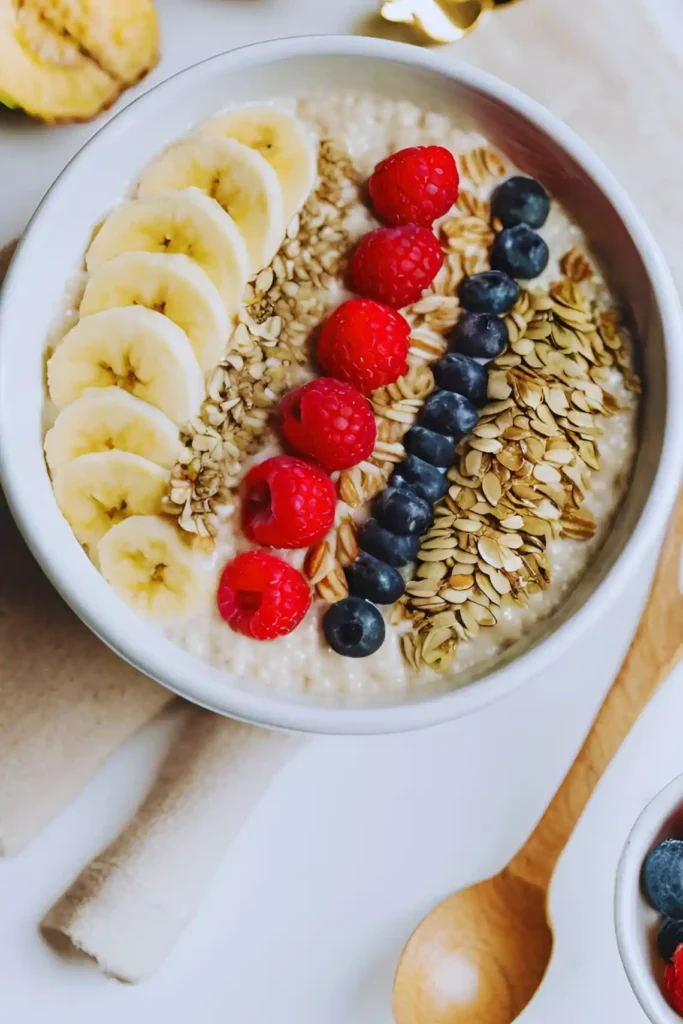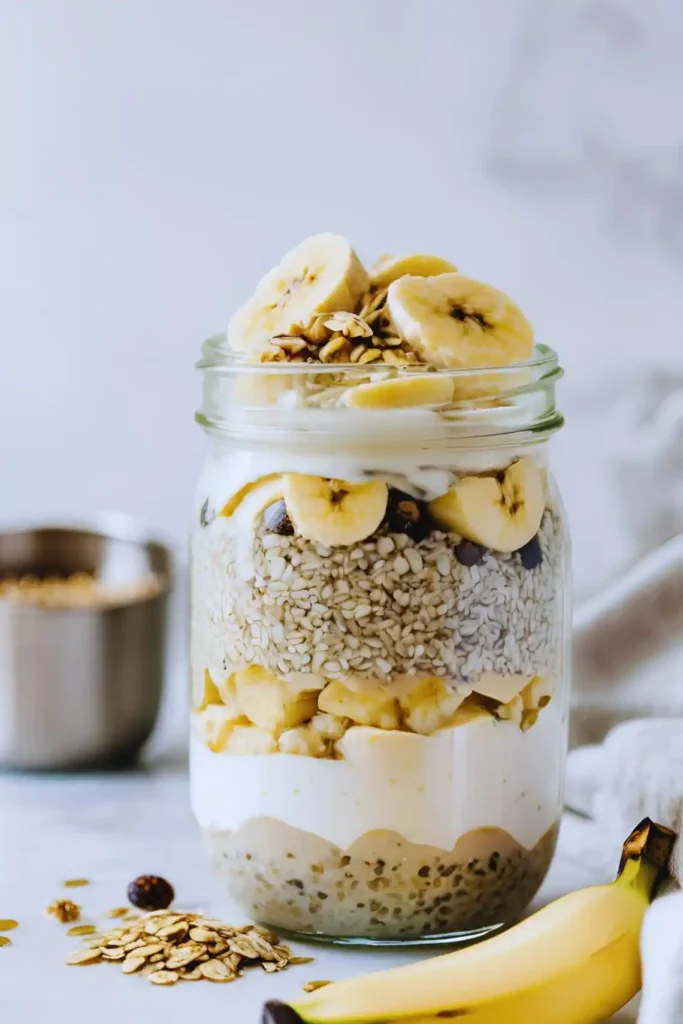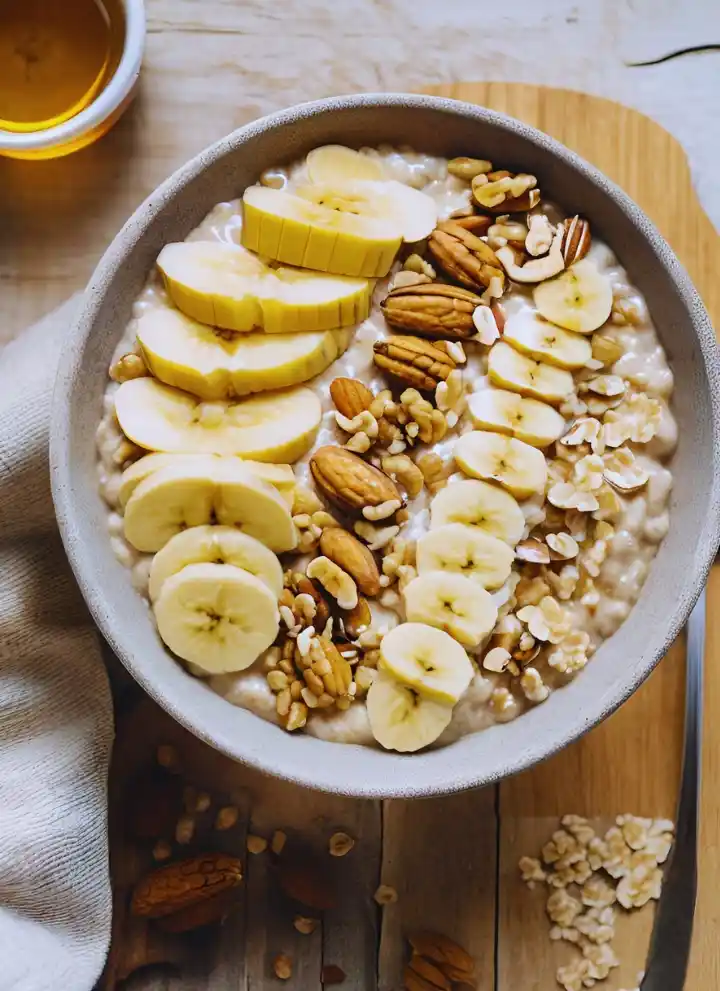Porridge and banana breakfast is one of the best ways to fuel your morning with essential nutrients. Breakfast is often dubbed the most important meal of the day, and for good reason — starting your morning with the right nutrients can set the tone for a productive and energetic day.
Among the plethora of breakfast options, porridge paired with banana stands out as a nutritional powerhouse that caters to both taste and health.
In an era where convenience often trumps nutrition, many gravitate towards pre-packaged, sugary breakfast items. However, these choices may lack the essential vitamins, minerals, and fibers that our bodies require. A bowl of porridge with banana offers a balanced, wholesome start that keeps you fueled and satisfied.
This article will explore why this combination is a perfect choice for breakfast, breaking down the nutritional benefits of both porridge and bananas, and how they work together to promote overall health.

The Nutritional Profile of Porridge
Key Ingredients in Porridge and Their Benefits
At its core, porridge is a simple yet versatile dish made from grains cooked in water or milk. The most common grain used is oats, but others like quinoa, barley, or millet can also serve as the base.
- Oats are rich in dietary fiber, particularly beta-glucan, which is known to support heart health by reducing bad cholesterol.
- They contain complex carbohydrates, which provide a steady release of energy.
- Porridge is also a source of essential minerals like magnesium, zinc, and iron, as well as B-vitamins, which aid in energy production.
In addition, porridge offers endless customization options, allowing you to incorporate toppings and flavors to enhance its nutritional value.
Oats are a popular base for porridge due to their impressive nutritional profile, much like how banana-based recipes such as banana pancakes balance indulgence with health benefits.
Oats vs Other Grains for Breakfast
While oats are the go-to choice for porridge, other grains also bring unique benefits:
- Quinoa: High in protein and contains all nine essential amino acids.
- Barley: Packed with fiber and antioxidants, it’s excellent for digestive health.
- Millet: A gluten-free option rich in magnesium and phosphorus.
Despite the variety, oats remain a favorite due to their affordability, ease of preparation, and robust nutritional profile. They are also widely available, making them accessible for most households.
Bananas: A Nutritional Powerhouse
Vitamins and Minerals in Bananas
Bananas are a nutrient-dense fruit that complements porridge perfectly. They are an excellent source of:
- Potassium: Vital for maintaining electrolyte balance and supporting healthy blood pressure levels.
- Vitamin C: An antioxidant that boosts the immune system and promotes skin health.
- Vitamin B6: Crucial for brain development and function, as well as energy metabolism.
In addition, bananas are naturally low in fat and sodium, making them a heart-healthy option.
Natural Sweetness and Fiber Content
One of the standout qualities of bananas is their natural sweetness. This makes them an ideal substitute for refined sugars when sweetening porridge.
Bananas are also rich in dietary fiber, particularly pectin and resistant starch, which:
- Aid in digestion.
- Promote feelings of fullness.
- Support blood sugar regulation.
This balance of sweetness and fiber makes bananas an excellent addition to a healthy breakfast.
The Combined Benefits of Porridge and Bananas
Energy-Boosting Properties
When combined, porridge and banana create a breakfast that delivers sustained energy. The complex carbs in porridge release glucose slowly, preventing spikes and crashes in blood sugar. The natural sugars in bananas provide an immediate energy boost without the need for added sweeteners.
This combination is particularly beneficial for those with active lifestyles, as it fuels the body effectively for workouts or long, demanding mornings.
Satiety and Weight Management
Eating porridge with banana helps with appetite control.
- The fiber in both foods slows digestion, promoting a feeling of fullness.
- This reduces the likelihood of snacking on unhealthy foods before your next meal.
- The low glycemic index of this combination also supports steady energy levels, preventing overeating.
For those aiming to maintain or lose weight, porridge with banana is an excellent choice due to its nutrient density and low calorie content relative to its volume.
How Porridge and Banana Support Health
Promoting Digestive Health
A healthy digestive system is the foundation of overall well-being. Both porridge and banana play critical roles in supporting gut health, thanks to their fiber content and unique properties.

Role of Fiber in Gut Function
Fiber is essential for maintaining a healthy digestive system, and both porridge and bananas are rich sources of dietary fiber.
- Beta-glucan fiber in oats: This soluble fiber helps regulate digestion by forming a gel-like substance in the gut. It:
- Slows down the absorption of nutrients.
- Keeps you full for longer.
- Promotes regular bowel movements by softening stool.
- Pectin and resistant starch in bananas:
- Pectin helps in binding water, improving stool consistency.
- Resistant starch, particularly in slightly unripe bananas, acts as a prebiotic, feeding beneficial gut bacteria.
Together, these fibers contribute to a well-balanced gut microbiome and reduce the risk of constipation, bloating, and other digestive issues.
Much like incorporating sourdough into your diet enhances digestion, using complementary ingredients like bananas in porridge ensures better gut health. Read more about sourdough’s nutritional benefits here.
Probiotic Potential with Additions
Adding probiotic-rich ingredients like yogurt or kefir to porridge amplifies its digestive benefits. These probiotics introduce good bacteria into your system, enhancing the gut’s ability to process and absorb nutrients efficiently. When paired with the prebiotic fibers from porridge and banana, it creates a symbiotic effect, fostering optimal gut health.
Heart Health Benefits
Both porridge and bananas have earned their reputations as heart-healthy foods. Their individual contributions to cardiovascular health make them a potent duo for reducing risk factors like high cholesterol and high blood pressure.
Cholesterol-Lowering Effects of Oats
Oats contain beta-glucan, a powerful soluble fiber that has been extensively studied for its role in lowering LDL (bad) cholesterol:
- Beta-glucan binds to bile acids, which are compounds produced by the liver using cholesterol. This binding process forces the liver to use more cholesterol, thereby lowering its levels in the bloodstream.
- Studies show that consuming 3 grams of beta-glucan daily (approximately found in a serving of oats) can reduce LDL cholesterol by 5–10%.
This makes porridge a heart-friendly choice for breakfast, especially for those aiming to manage or prevent cardiovascular disease.
Potassium in Bananas for Blood Pressure Control
Bananas are one of the richest sources of potassium, a mineral that plays a vital role in regulating blood pressure.
- Potassium helps counteract the effects of sodium by:
- Relaxing blood vessel walls.
- Improving circulation.
- Balancing electrolyte levels.
Consuming a banana with porridge each morning can contribute significantly to meeting the recommended daily potassium intake of 3,500–4,700 mg. This makes the meal an excellent choice for individuals with hypertension or those looking to prevent it.
Sustained Energy for the Day
A breakfast that provides long-lasting energy is essential for maintaining productivity and focus throughout the day. The combination of porridge and banana achieves this by balancing quick and slow-releasing carbohydrates.
Low Glycemic Index Foods and Energy Regulation
The glycemic index (GI) is a measure of how quickly foods cause blood sugar levels to rise.
- Oats have a low GI, meaning they release energy gradually, keeping blood sugar levels stable.
- Bananas, especially when slightly green, also have a low to medium GI, which prevents sudden spikes or crashes.
This combination ensures a steady energy supply, helping you stay active and alert for hours after breakfast.
Reducing Mid-Morning Hunger
Feeling hungry before lunch often leads to unhealthy snacking. A bowl of porridge with banana helps prevent this by promoting satiety:
- The fiber in oats and bananas slows digestion, delaying the return of hunger.
- The natural sweetness of bananas satisfies cravings, reducing the temptation for sugary snacks.
This makes porridge and banana an ideal breakfast choice for those managing busy schedules or adhering to weight-loss goals.
Additional Benefits: Antioxidants and Immunity
Both oats and bananas offer antioxidants that help fight oxidative stress:
- Oats contain avenanthramides, compounds that have anti-inflammatory properties and improve circulation.
- Bananas provide Vitamin C and other antioxidants that support the immune system.
Together, they enhance your body’s ability to combat inflammation and infections.
Preparing the Perfect Porridge and Banana Breakfast
Choosing the Right Type of Oats
The foundation of a delicious and nutritious bowl of porridge lies in selecting the right type of oats. While oats may seem similar, their texture, cooking time, and nutritional value can vary significantly.
Steel-Cut, Rolled, or Instant Oats?
Here’s a breakdown of the three main types of oats to help you choose:
- Steel-Cut Oats:
- Made by chopping whole oat groats into pieces.
- Have a chewy texture and nutty flavor.
- Take the longest to cook (20–30 minutes), but their low glycemic index ensures sustained energy release.
- Rolled Oats:
- Steamed and flattened oat groats.
- Cook quickly (5–10 minutes) and have a softer texture.
- Retain most of their fiber and nutrients, making them a versatile choice.
- Instant Oats:
- Pre-cooked and finely processed for rapid preparation (1–2 minutes).
- Convenient but often contain added sugars and flavors.
- Slightly lower in fiber due to processing.
For the best balance of nutrition and convenience, rolled oats are the ideal choice. If you have more time, steel-cut oats provide a heartier meal, while instant oats can work in a pinch—just be mindful of added ingredients.
Creative Toppings for Your Porridge
Adding toppings to your porridge not only enhances its flavor but also boosts its nutritional profile. Bananas are a staple topping, but there are countless ways to get creative while maintaining the health benefits.
Adding Bananas in Different Ways
- Sliced Fresh Bananas:
- The classic option. Provides natural sweetness and a creamy texture.
- Mashed Bananas:
- Stir mashed banana directly into the porridge during cooking for a smooth and sweet blend.
- Caramelized Bananas:
- Lightly sauté banana slices in a skillet with a touch of honey or cinnamon for a dessert-like topping.
Complementary Ingredients for Flavor and Nutrition
Enhance your porridge with additional toppings for a nutrient-packed breakfast:
- Nuts and Seeds:
- Almonds, walnuts, chia seeds, or flaxseeds add healthy fats, protein, and crunch.
- Berries:
- Blueberries, strawberries, or raspberries provide antioxidants and a burst of tangy flavor.
- Spices:
- Cinnamon or nutmeg pairs beautifully with bananas, adding warmth and depth to your porridge.
- Yogurt or Milk Alternatives:
- A dollop of Greek yogurt or almond milk boosts creaminess and protein content.
These combinations make every bowl unique while keeping your breakfast nutritious and satisfying.
Quick Recipes for Busy Mornings
Time constraints shouldn’t compromise a healthy breakfast. Here are two quick and easy recipes featuring porridge and bananas for those on the go.

Overnight Oats with Banana
Ingredients:
- ½ cup rolled oats
- ½ cup milk (or plant-based alternative)
- ½ banana (sliced)
- 1 tsp chia seeds
- 1 tsp honey or maple syrup (optional)
- Pinch of cinnamon
Instructions:
- Combine oats, milk, chia seeds, and cinnamon in a jar or bowl.
- Stir well, cover, and refrigerate overnight.
- In the morning, top with sliced banana and drizzle with honey if desired.
- Enjoy cold or heat for a warm option.
This recipe is perfect for meal prep, as you can prepare several jars at once for the week.
Microwave-Friendly Porridge with Banana
Ingredients:
- ½ cup rolled oats
- 1 cup water or milk
- ½ banana (mashed or sliced)
- Pinch of salt
- Optional toppings: nuts, seeds, or honey
Instructions:
- Combine oats, liquid, and salt in a microwave-safe bowl.
- Cook on high for 2–3 minutes, stirring halfway through.
- Stir in mashed banana or top with slices after cooking.
- Add any optional toppings and serve warm.
This method is ideal for a quick, wholesome breakfast in under five minutes.
Preparing a nutritious breakfast doesn’t have to be time-consuming, as shown in these easy banana-based creations like banana waffles.
Addressing Common Concerns
Despite its numerous benefits, some individuals may have concerns about eating porridge and banana daily. Let’s address a couple of common questions.
Is Porridge and Banana Too High in Carbs?
While it’s true that porridge and bananas contain carbohydrates, they are primarily complex carbs and natural sugars, which are vastly different from refined carbs.
- The fiber content in both porridge and bananas slows the absorption of sugars, preventing blood sugar spikes.
- Pairing this meal with healthy fats (e.g., nuts or seeds) and protein (e.g., yogurt or milk) further balances its macronutrient profile.
For those on low-carb diets, simply reduce the portion size or pair it with higher-protein additions like eggs.
Customizing for Specific Dietary Needs
Porridge and banana can be tailored to fit various dietary requirements:
- Gluten-Free:
- Use certified gluten-free oats to avoid cross-contamination.
- Vegan:
- Cook porridge with plant-based milk like almond, oat, or soy milk.
- Low-Calorie:
- Skip sweeteners and use water instead of milk for cooking.
- High-Protein:
- Add a scoop of protein powder or stir in Greek yogurt.
FAQs About Porridge and Banana Breakfast
1. Why is porridge considered a healthy breakfast option?
Porridge is a powerhouse of complex carbohydrates, fiber, and essential nutrients like magnesium and B-vitamins. It provides a steady energy release throughout the morning and supports digestion. Moreover, its versatility allows you to add nutrient-rich toppings, like bananas, for additional health benefits. For other hearty and balanced breakfast ideas, check out banana pancakes.
2. Are bananas suitable for people with diabetes?
Yes, bananas can be part of a diabetic-friendly diet due to their low glycemic index, especially when paired with fiber-rich foods like oats. The fiber in bananas helps regulate blood sugar, but it’s best to consume them in moderation. You can explore more healthy banana-based recipes in our guide to banana waffles.
3. What toppings can I add to porridge besides bananas?
In addition to bananas, you can add nuts, seeds, berries, or even yogurt to your porridge. Spices like cinnamon or nutmeg can enhance flavor too. If you’re feeling adventurous, explore unique options like caramelized fruits, as highlighted in our post about cooking fruits in a waffle maker.


